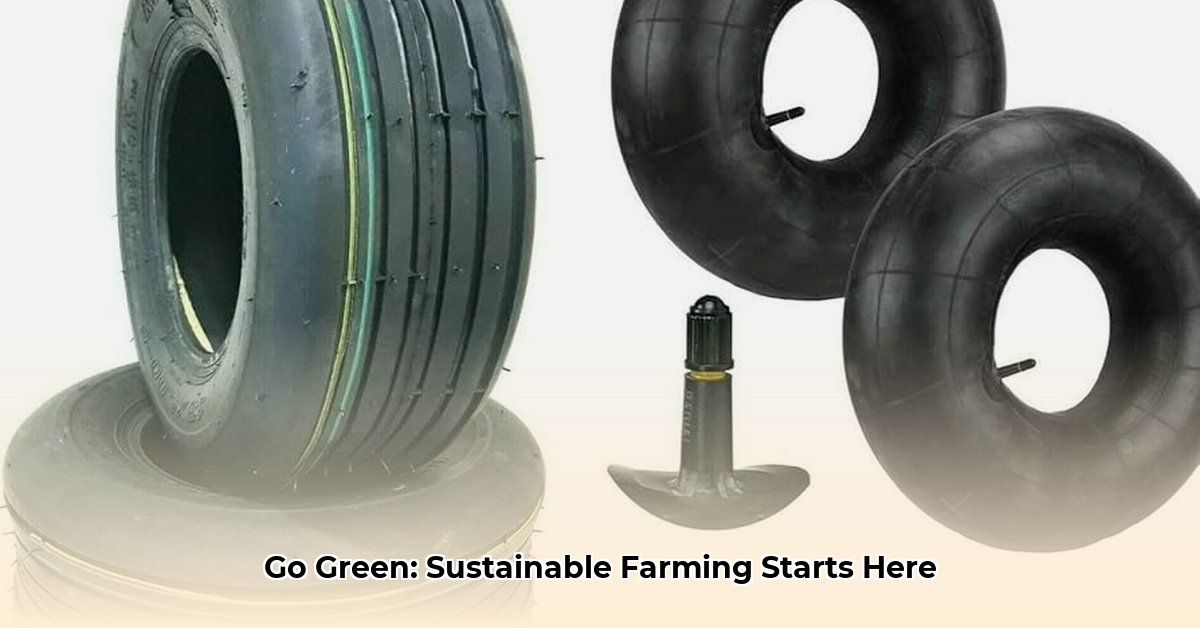
Lawn Tractor Tires Tractor Supply: Your Guide to Eco-Friendly Lawn Care
Choosing the right tires for your lawn tractor isn't just about performance; it's about environmental responsibility. This guide helps you select tires that benefit your lawn, your budget, and the planet. We'll explore sustainable options available at Tractor Supply and other retailers, emphasizing long-term cost savings and environmental benefits. For more tire change tips, see our guide.
Going Green: Beyond the Rubber
Traditional tire manufacturing is energy-intensive and relies heavily on oil. However, innovative sustainable alternatives are emerging. Guayule, a drought-resistant plant, produces high-quality natural rubber with a significantly smaller environmental footprint than petroleum-based rubber. Other advancements include tires made from recycled rubber and other eco-friendly materials. These offer comparable durability with reduced environmental impact. Isn't it time to consider a greener option?
Finding Sustainable Lawn Tractor Tires
Locating eco-friendly tires is becoming increasingly straightforward. Tractor Supply and similar retailers offer various options. Look for labels or descriptions highlighting sustainable materials like recycled rubber or environmentally conscious manufacturing processes. Even small design improvements extending tire life significantly reduce environmental impact over time. Engage with store employees; they can offer valuable insights into the most sustainable options. Online reviews also provide valuable feedback from other consumers.
Maximize Your Tire’s Lifespan (And Save Money!)
Proper tire care is crucial for maximizing your investment and minimizing environmental impact. Regularly checking tire pressure is vital. Under-inflation leads to faster wear, increased fuel consumption, and greater environmental damage. Over-inflation can also cause damage. Always consult your owner's manual for recommended tire pressure. Rotating tires regularly ensures even wear, extending their lifespan. These simple steps not only improve tire longevity but also significantly reduce your environmental footprint. How can you ensure you're getting the most out of your tires?
Beyond the Tires: Sustainable Lawn Care Practices
Sustainable lawn care extends beyond tire selection. Consider using compost or organic fertilizers instead of chemical options. These gentler alternatives improve soil health and reduce environmental impact. Reducing lawn size minimizes the workload for your tractor, thereby reducing fuel consumption. Small changes, when accumulated, contribute significantly to sustainable lawn care. What other steps can be taken to minimize the environmental impact of lawn care?
Making Smarter Choices: Sustainability and Performance
Investing in sustainable lawn tractor tires offers multiple benefits. It reduces your environmental footprint and, due to longer lifespan, often leads to long-term cost savings by reducing replacement costs. When replacing tires, remember that sustainability and performance are not mutually exclusive. Numerous excellent alternatives prioritize both environmental responsibility and efficient lawn care. Always consult your owner's manual for specific recommendations.
The Future of Sustainable Tires: Ongoing Research and Development
The field of sustainable tire technology is constantly evolving. Research focuses on new bio-based materials, efficient manufacturing processes, and improved tire designs that further extend tire life. Experts predict even more innovative eco-friendly options in the near future. Staying informed about these advancements allows you to make even more environmentally responsible choices. The journey towards truly sustainable tires is ongoing, and the current improvements are genuinely exciting. What innovations can we expect in the near future regarding tire sustainability?
How to Choose Sustainable Tires for Improved Farm Efficiency
Key Takeaways:
- Choosing the right tires significantly impacts farm efficiency and environmental sustainability.
- Radial tires offer superior long-term value, despite a higher initial cost.
- Tire selection must consider soil types and operational needs.
- Proper tire inflation and ballasting are crucial for optimal performance and longevity.
- Sustainable tire choices reduce soil compaction, conserve fuel, and minimize environmental impact.
Understanding Your Soil and Needs
Before selecting tires, assess your soil type. Different soils require different tread patterns. Clay soils need aggressive treads for traction, while sandy soils might benefit from gentler patterns to prevent slippage. Consider your tractor's workload; heavy hauling requires more robust tires than lighter tasks. Finding the right fit ensures optimal performance and minimizes soil disturbance.
Radial vs. Bias-Ply: A Long-Term Investment
While bias-ply tires have a lower initial cost, radial tires offer superior long-term value. They provide better fuel efficiency, reducing both fuel costs and emissions, while minimizing soil compaction. Less compaction leads to healthier soil, better crop yields, and a reduced environmental footprint. The initial cost savings of bias-ply tires are often offset by increased fuel consumption and shorter tire lifespan.
Tread Patterns: Matching Tires to Terrain
Various tread patterns are designed for specific soil types and operations. R-1s are versatile, R-1Ws are ideal for wet conditions, R-2s excel on softer soils, R-3s are gentle on turf, and R-4s are used for high-flotation applications. Choosing the right tread ensures optimal performance and minimizes soil disturbance.
Tire Maintenance: Extending the Life of Your Investment
Consistent inflation is crucial to prevent premature wear and tear. Properly inflated tires reduce rolling resistance, saving fuel and money. Regular inspections identify potential problems early on, extending tire lifespan.
Ballasting: Optimizing Traction and Stability
Adding weight to tires enhances traction and stability, particularly on slopes or with heavy loads. However, balance is key; excessive weight can lead to increased soil compaction. Optimal weight depends on soil conditions.
Looking Ahead: Sustainable Materials and the Future
Research into sustainable materials for farm tires is ongoing, focusing on enhancing durability and reducing environmental impact. Stay informed about these advancements to adopt the most eco-friendly options available.